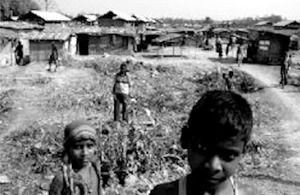DFID Research: connecting researchers, journalists and activists to change policy
How reporting the plight of displaced people brought a pledge of relief from local government.

Internally displaced people lack a voice in South Asia. Picture: Panos
In February 2007, Thannganing Hungyo, a journalist for the Northeast Indian daily, The Morung Express, attended the launch of a research report called Voices of the Internally Displaced in South Asia, organized by Panos South Asia, Panos London’s Relay Programme partner in North East India.
The report by the Calcutta Research Group explored the plight of internally displaced people (IDPs) in India, Bangladesh, Nepal and Sri Lanka by conducting surveys, holding focus group discussions and interviewing individuals. The study found that IDPs suffered poor health due to lack of facilities as well as high levels of unemployment, and that they faced persecution and discrimination. It made several recommendations including that the status of IDPs be legally recognized by country governments.
During the launch, Thannganing Hungyo and 15 other journalists were able to interact with the researchers and ask questions about the report.
The day after the launch Thannganing participated in a study tour along with 10 other journalists and a few young researchers and activists. They visited an IDP camp in Western Assam, where they interviewed IDPs, saw how research for the report was conducted and wrote detailed articles for their local newspapers.
The buzz that these articles created in the week following the launch caused the local government to react, announcing an immediate pledge of relief to people living in the camps.
This study tour model, designed and coordinated by Panos London’s Relay Programme in NE India, fosters communication between journalists, researchers and advocacy groups.
The Relay programme works across NE India as well as Eastern and Southern Africa. It also links to research and research communication organisations in the UK to create educational and informative connections between journalists and researchers. Relay organizes study tours like the one Thannganing attended, forms working groups consisting of both researchers and journalists, and arranges exchange visits between research facilities and media houses.
These projects not only increase levels of trust between journalists and researchers, but they also help to form meaningful and useful relationships between the two, giving both groups an opportunity to work together. As a result, important research issues are given a space to be debated in the media and, as Relay has discovered, this debate can lead to positive political outcomes.
Thanks to these projects, there has been a marked trend in the regions where the Relay programme works for journalists to use research and write more analytical reports.
Dr. Walter Fernandez of the North East Social Research Centre noticed this change. “Conflict issues have always been reported from the shallow and biased perspective of the Indian state,” he said, “but I am pleased that our report on Development Induced Displacement in Assam from 1947 to 2000 got in-depth and repeated coverage in the media throughout Assam. It was the first time I saw that. The journalists keep coming back for the report and asking whether we will do follow-up studies on the issue.
“We have received letters from people, and others who just walked into our premises to ask out of curiosity whether what we write about on conflict and displacement is actually true” says Thannganing Hungyo.